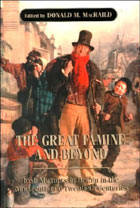Author's response
| Book: | The Great Famine and Beyond: Irish Migrants in Britain in the Nineteenth and Twentieth CenturiesDonald M. MacRaild (ed.)Dublin, Irish Academic Press, 2000; pp. xii, 303. |
| Reviewer: | Paul O'LearyLecturerDept. of History & Welsh History University of Wales Aberystwyth |
Paul O'Leary has written a very gracious review of my edited book and I am delighted to be able to respond to it. O'Leary's own work in the field is well-known and well-respected, not least the major monograph he has just published which fills what was an enormous gap in our appreciation of the complexities of Irish migration and community building in Wales. (Immigration and Integration: The Irish in Wales, 1798-1922, University of Wales Press, 2000). In taking up issues raised by O'Leary, I must state outright that what I offer here is a collection of my own opinion and thoughts. So, while I will pick up on issues he raises in discussing other contributors' essays, what I say is not necessarily what the individual authors would have said.
O'Leary offers telling insights into all aspect of the Irish migrant experience. The volume was intended to have a distinct comparative strand and this is noted, and discussed, in the review. There is no question in my mind that comparative history is important; like O'Leary, I, too, am surprised that so little genuinely comparative research has been conducted in the field. Other migrant groups, such as Bailly's Italians, have been the subject of comparative analysis. When writing my chapter on the possibilities of studying Irish migrants as part of the wider Atlantic economy, I was echoing ideas put forward by Lyn Lees (albeit briefly) in the first chapter of her study of the Irish in London (Exiles of Erin: The Irish in Victorian London, Manchester University Press, 1979) and recent theoretical discussions by Nancy Green and Donald Akenson. But there was little else, relating to the Irish, which could be employed in my framework. I therefore must acknowledge that much more can, and should, be done. How different were the Irish in Britain? How quickly did they 'assimilate'? Did they experience socio-economic improvement across generations? Did they come fully to participate in society? Questions such as these can only be answered following the sort of comparative reflection that also influenced the contributions to this volume of Alan O'Day and John Belchem. The answers to such questions, moreover, tell us as much about receiving communities as about the migrant group. With the current vogue for seeing migration as diasporic - as part of an international community - the need for a comparative method becomes even more salient.
O'Leary spends considerable time discussing Sheridan Gilley's essay on Irish Catholicism in 19th century England. The problem of balancing religious and social interpretations of the migrants' church has vexed historians since E.P. Thompson wrote the Making of English Working Class (1963), a volume which has the priest more or less stereotypically cast as the dispensing chemist of Marx's opiate of the masses. Gilley has written numerous important articles that seek to underpin the fundamental religiosity of the Irish and of religious practice itself. He takes issue with studies that secularise explanations of religion. In so doing, he has a strong case. Both O'Leary and Gilley accept that a religious history also has a social dimension: the difficulty, however, lies in the explanation of intention, and in balancing that with the conflict of understanding which is implicit in studying behaviour that is simultaneously spiritual and social.
O'Leary also makes vital points about the concepts of ethnicity and integration. His own book on the Welsh Irish illustrates how the Irish passed into Welsh society while demonstrating that the process was sometimes slow, often variable and rarely unproblematic. But the complexities of migration and community building are such that one fears a satisfactory model might never be constructed. O'Leary hits on just this issue when, in reviewing the book, he poses a fascinating and, as yet, unanswerable question as to the pace of Protestant Irish integration into British society. In truth, we know little about Protestant Irish settlers in any part of the English-speaking world, save perhaps for Canada (where Akenson, Houston and Smyth, Darroch and Ornstein have conducted vital work). In Britain, it would appear to be necessary to ask different sorts of questions about the Irish Protestants than one would ask about their Catholic counterparts. Protestants held a diametrically different set of ethnic attachments which were shaped by cultural tradition as well as material existence. They had the Orange Order where Catholics had a variety of societies dedicated to a Catholic view of the world; they tended to be unionist rather than home rulers; they were more likely to be skilled than Catholics; and it is likely they voted Conservative rather than Liberal, although there was certainly a shift towards Labour after 1900.
But how much any of this applies, and to what degree and at what point in time, remains a subject for serious study. I therefore agree wholeheartedly with O'Leary when he says that this, like other issues he raises, need to be put under the historical microscope. I am not sure if the volume will ultimately merit O'Leary's concluding remark - that it will be 'a key reference for students and researchers for some time to come' - but the thought, like the sentiment behind it, is a nice one.
June 2000

